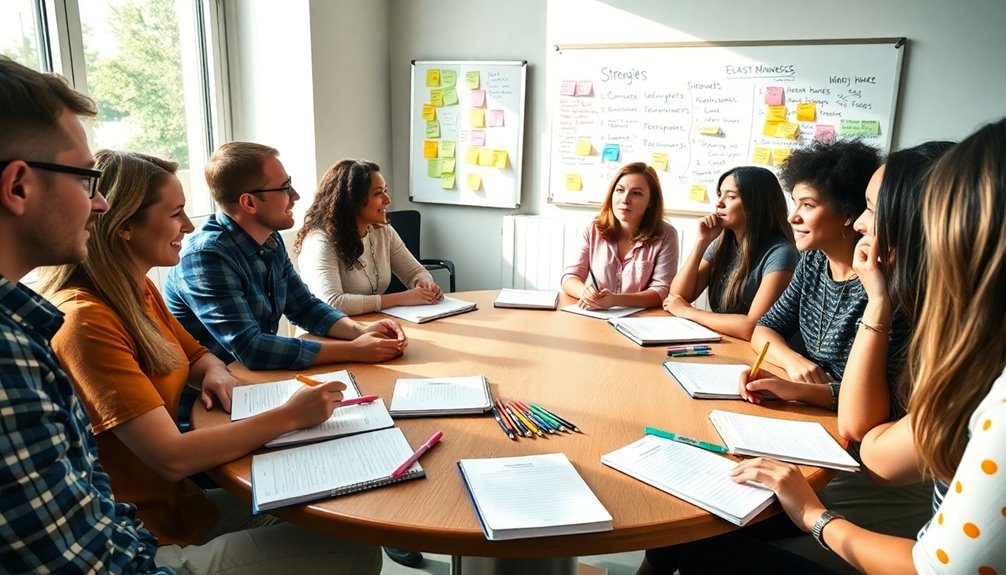Mastering strengths and weaknesses in a teacher interview is essential for demonstrating self-awareness and your growth mindset. You should highlight strengths that align with the role, like creativity in lesson design or strong communication skills. When discussing weaknesses, choose a minor one, and explain how you've actively worked to improve it, emphasizing your commitment to growth. Authenticity is key; it builds trust and rapport. Remember, sharing personal experiences, like overcoming challenges or participation in mentorships, showcases your continuous development. Keep these strategies in mind, and you'll be well-prepared for success. You'll discover more effective techniques as you explore further.
Key Takeaways
- Identify and articulate strengths that align with teaching roles, such as creativity and strong communication skills.
- Choose a minor weakness, providing context and specific measures taken for improvement.
- Emphasize a commitment to self-improvement and adaptability in overcoming challenges.
- Use examples of personal growth to illustrate how you enhance the learning experience for students.
- Maintain a positive tone and authenticity to build rapport and trust during the interview.
Understanding Interview Questions

Understanding interview questions about strengths and weaknesses can feel intimidating, but it's an essential aspect of the hiring process. You'll often face questions like, "What's one of your greatest weaknesses?" or "What feedback have you received?"
These questions assess your self-awareness and ability to recognize areas for improvement. Employers value candidates who can reflect on their experiences and demonstrate a growth mindset.
When you discuss your strengths, be ready to provide examples that showcase how they align with the role. Remember, talking about weaknesses might feel vulnerable, but it's a chance to highlight your willingness to grow. Additionally, approaching these questions with a mindset of emotional intelligence can further enhance your responses.
Ultimately, showing confidence in your abilities and acknowledging areas for improvement can set you apart from other candidates.
Strategies for Discussing Weaknesses

When discussing weaknesses in an interview, it's crucial to approach the topic strategically. Start by identifying a minor weakness that won't jeopardize your candidacy.
Use the formula: weakness + context + improvement measures. Explain how this weakness has impacted your work, then detail specific actions you've taken to address it.
For instance, if procrastination is your weakness, share how you've implemented time management techniques to improve your efficiency. Keep the tone positive and optimistic, focusing on your commitment to self-improvement. Continuous learning is essential in this process, as it showcases your dedication to personal growth.
Avoid claiming you have no weaknesses, as this can come off as insincere. Authenticity builds trust with interviewers and demonstrates your willingness to grow, making you a more appealing candidate.
Examples of Common Weaknesses

Many candidates struggle to articulate their weaknesses during interviews, often fearing that it might jeopardize their chances.
Common weaknesses you might consider mentioning include being overly detail-oriented, which can lead you to miss the bigger picture. You could also discuss your difficulty in saying no, resulting in taking on too much work and feeling overwhelmed.
Another example is hesitance in asking for help, which might hinder collaborative efforts. Additionally, if you tend to hold onto projects longer than necessary, it can delay completion due to over-criticism.
Finally, if you've had challenges with public speaking, sharing how you've tackled that fear can showcase your commitment to improvement. Understanding the importance of establishing clear boundaries can also help in managing workload and stress effectively.
These examples illustrate self-awareness and a proactive approach to personal growth.
Identifying Teacher Strengths

Identifying your strengths as a teacher is essential for making a lasting impression during interviews. Start by reflecting on your unique skills and experiences. Are you tech-savvy, using educational apps to enhance learning? Maybe creativity is your strength, allowing you to design engaging lessons. Consider your ability to connect with students—do you foster participation and a positive classroom environment? Communication is also key; think about how you keep parents informed and involved. Finally, assess your resourcefulness; can you adapt materials for diverse learning styles? Additionally, understanding the Law of Attraction principles can help you maintain a positive mindset, which is crucial in an interview setting.
Highlighting Personal Growth

Throughout your teaching career, highlighting personal growth can set you apart in an interview. It shows potential employers that you're adaptable and committed to self-improvement.
Share specific experiences where you faced challenges and how you overcame them. For instance, if you struggled with classroom management, explain how you sought mentorship or attended workshops to refine your skills.
Discuss how these experiences not only enhanced your teaching but also positively impacted your students. Emphasize your willingness to learn and adapt, illustrating a growth mindset.
Strategies for Improvement

Improvement strategies are essential for any teacher aiming to enhance their effectiveness and adapt to new challenges. Start by identifying specific areas where you want to grow, whether it's public speaking or technology skills.
Enroll in relevant courses or join local speaking groups to gain confidence and knowledge. Set clear, achievable goals for your professional development, and regularly assess your progress.
Collaborate with peers to share insights and best practices, which can provide valuable feedback. Additionally, utilize self-help resources to cultivate a growth mindset.
Handling Stressful Situations

Managing stressful situations can be a challenge, but with the right strategies, you can turn pressure into a productive experience.
Start by recognizing your common reactions, like sweating or panic, and prepare for potential stressors, such as tough interview questions about weaknesses.
Use the STAR method to structure your responses—clearly outline the Situation, Task, Action, and Result. This approach helps you stay focused and articulate your experiences effectively.
Additionally, practice mindfulness techniques, like deep breathing or visualization, to calm your nerves before the interview. Incorporating public speaking techniques can also enhance your confidence and reduce anxiety in high-pressure situations.
Frequently Asked Questions
How Can I Effectively Research a School Before the Interview?
To effectively research a school before your interview, start by visiting their website to understand their mission, values, and programs.
Check social media for recent updates and community engagement.
Read reviews from parents and students to gauge the school environment.
If possible, talk to current or former staff to gain insider perspectives.
This background knowledge will help you tailor your answers and demonstrate genuine interest during your interview.
What Types of Questions Should I Prepare for My Interview?
You should prepare for a variety of questions during your interview.
Expect inquiries about your teaching philosophy, classroom management strategies, and how you engage students.
Be ready to discuss your strengths and weaknesses, providing specific examples.
Also, anticipate scenario-based questions that evaluate your problem-solving skills.
Finally, prepare thoughtful questions for the interviewer about the school's culture and expectations, showing your genuine interest in the position.
How Can I Make a Strong First Impression?
You walk into the room, heart pounding, and then you catch a glimpse of the interview panel.
To make a strong first impression, you need to exude confidence and positivity. Greet them with a warm smile and a firm handshake. Maintain eye contact and engage them with your enthusiasm for the role.
Prepare a compelling introduction about yourself, showcasing your passion and qualifications.
What Should I Wear to a Teacher Interview?
When preparing for a teacher interview, you should aim for a professional yet approachable outfit.
Opt for a nice blouse or shirt paired with dress pants or a skirt. Consider wearing a blazer for added professionalism.
Choose comfortable shoes, since you'll want to feel confident while walking and standing.
Avoid overly casual attire, but don't go too formal either; you want to reflect the school's culture while showcasing your personality.
How Do I Follow up After the Interview?
Following up after an interview is like sending a warm hug—it's a way to connect and show appreciation.
You should send a thank-you email within 24 hours, expressing gratitude for the opportunity and reiterating your interest. Mention something specific from the conversation to personalize it.
Keep it concise and professional. This gesture reflects your enthusiasm and professionalism, making you memorable in the hiring manager's mind as they finalize their decision.
Conclusion
In conclusion, mastering the discussion of your strengths and weaknesses can greatly enhance your chances in teacher interviews. Remember, "a smooth sea never made a skilled sailor." Embrace every opportunity to reflect on your qualities and areas for growth. By presenting your strengths confidently and addressing your weaknesses with a focus on improvement, you'll show hiring managers your commitment to personal development and your potential to create a nurturing learning environment for your students.









